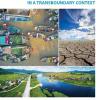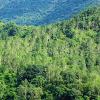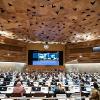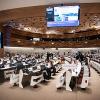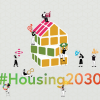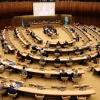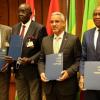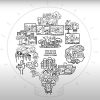Press Releases
Displaying Results 126 - 150 of 180
Developed in the first half of the 20th century, persistent organic pollutants (POPs) have been regulated or banned as widespread public concern over their toxicological effects for human health and the environment has increased. Research has shown that exposure to POPs can lead to
Which users may use how much water of a river, lake, aquifer or other source? For what purposes, where and when?
These are the questions which a new Handbook on transboundary ‘water allocation’–which is the process and/or outcome of determining how different stakeholders use water–published under
Almost 2 years into the pandemic, we have all experienced long and repeated lockdowns. Recent news from New Delhi, however, tell us that the city has gone into another lockdown – this time because of heavy air pollution.
Winter is also the season when air
Today, the Inaugural Meeting of the Working Group on Tailings Safety and the Prevention of Accidental Water Pollution (IIWG) took place in Tajikistan, bringing together representatives of different national authorities, operators, international institutions and interested specialists to strengthen
Protecting and restoring forests, as well as unlocking their potential to ensure livelihoods, green development, and a more sustainable outlook for humanity, were key points discussed during European Forest Week and Foresta2021 by the Joint Session of the UNECE Committee on Forests and the Forest
The impacts of climate change on forests will be profound. Yet global emissions reduction models rely on the ability for forests to both sequester carbon and scale up production of innovative new products that can replace emissions-intensive materials used in construction, textiles and energy
The renewable energy sector in Serbia is preparing for the first round of renewable energy auctions for the provision of renewable electricity. In view of the country’s potential, a large number of bidders are expected to take part in these pilot auctions for a total capacity of 400 MW. This
SPECA countries have experienced the effects of climate change and the COVID-19 pandemic on key aspects of economic development and cooperation, with negative consequences for sustainable development. COVID-19 related restrictions and border closures caused serious disruption to supply chains and
Sales of electric and hybrid vehicles are surging in major markets including China, Europe and North America, and reached 3 million vehicles in 2020, 4.6% of total sales. In Europe, their market share reached 10%. According to the projections of the International Energy Agency, their global market
The world’s urban areas are responsible for the vast majority of CO2 emissions. But cities, led by Mayors, are pushing forward the climate action that will be vital to keep the 1.5°C target alive, adapting to climate change impacts, and making their voices heard alongside national governments at
The shift to a decarbonized Hydrogen-based economy that can achieve Carbon Neutrality by 2050 in line with the objectives of the Paris Agreement, requires swift and extensive expansion of renewable and low-carbon hydrogen production. This will require massive investments and appropriate policy
UNECE re-launched its High-Performance Buildings Initiative at COP-26 to deliver on the Paris Agreement and the 2030 Agenda for Sustainable Development. At a ceremony at the Construction Scotland Innovation Centre (CSIC) in Hamilton, today, 8 International Centres of Excellence on High
Increasingly frequent and intense extreme weather events due to climate change that can lead to industrial accidents and unchecked urban and regional development could together be a recipe for disaster, warn the UN and the governments of
Today, Serbia became the first country in the pan-European region to launch a National Policy Dialogue (NPD) on Industrial Safety, supported by UNECE in the framework of the Convention on the Transboundary Effects of Industrial Accidents (Industrial Accidents Convention). Since its accession to the
A decision establishing a rapid response mechanism for the protection of environmental defenders was adopted by the Meeting of the Parties to the Convention on Access to Information, Public Participation in Decision-Making and Access to Justice in Environmental Matters (Aarhus Convention) at its
This week nearly 450 participants from close to 50 countries attended the seventh and fourth sessions of the Meetings of the Parties to the Aarhus Convention (Convention on Access to Information, Public Participation in Decision-making and Access to Justice in Environmental Matters)
Global estimates for financing needs for water-related investments to achieve Sustainable Development Goal 6 on water range from $6 .7 trillion by 2030 to $22.6 trillion by 2050, according to the OECD. Investments are needed not only to build new infrastructure but also to maintain and operate
Today, more than 2 billion ha of lands globally are deforested and degraded causing competition for scarce land and natural resources, hunger and threats to livelihoods. Major causes, particularly, in Eastern and South-Eastern Europe are linked to pests, diseases, droughts, forest fires, wind
Humanity is facing not one but three intertwined crises: the COVID-19 pandemic, climate change, and a lack of adequate and affordable housing. Each of these three emergencies has the potential to compound the multidimensional impacts of the others in health,
Approximately 50 million people in the UNECE region live in inadequate housing conditions. In the 21st century, the governance, land and finance systems that influence the delivery and consumption of housing have been beset by numerous crises. Emanating from climate change, unguided investment
Can the oft-shared, yet increasingly scarce and most precious, resource that is water be a source of cooperation, rather than of conflict, among countries? If so, then how? As climate change brings prolonged droughts and more intense floods, how will Governments cope together? More than 20
Ministers from The Gambia, Guinea Bissau, Mauritania and Senegal have agreed to establish a legal and institutional framework for cooperation on the Senegal-Mauritanian Aquifer Basin (SMAB), a shared aquifer basin (groundwater reserve) on which
Joining the Convention on the Protection and Use of Transboundary Watercourses and International Lakes (Water Convention) makes a difference! Parties to the Water Convention constantly advance water cooperation at the basin, subbasin and bilateral levels. The conclusion of at least 10 new
Globally, 690 million people suffer from hunger and three billion cannot afford healthy, nutritious food. Despite this, the Food and Agriculture Organization of the United Nations (FAO) estimates that one-third of all food fit for consumption is either lost during the production or shipping process
The COVID-19 pandemic has had a multi-dimensional effect on the UNECE region, causing the worst economic contraction in decades. Cities and urban areas, with their high population density and interconnectivity, were particularly vulnerable and encountered major disruptions. The pandemic impacted

